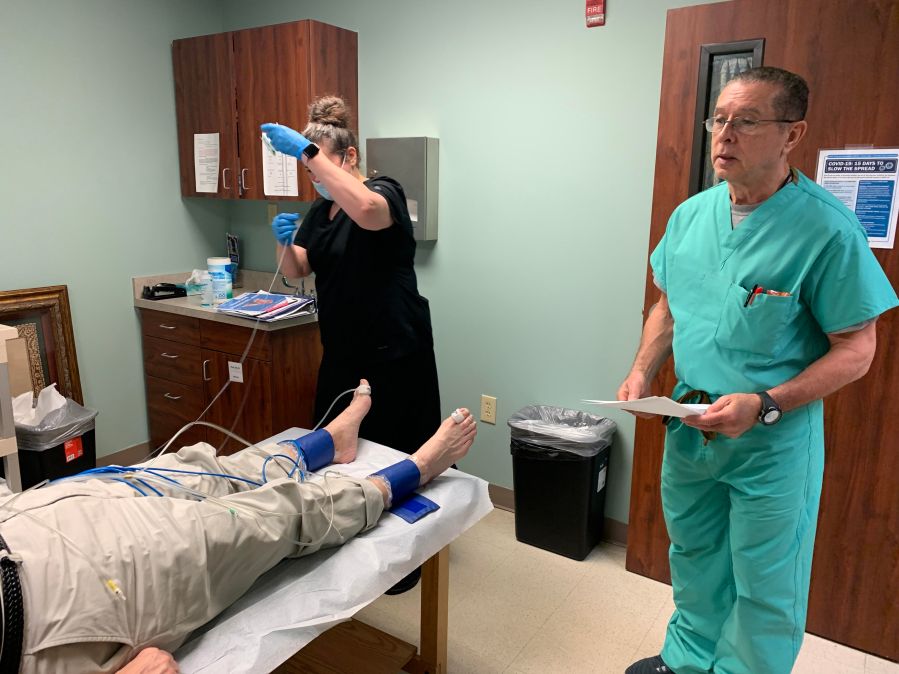Cardiovascular
Dr. Gary Jones: Your Heart’s Ally! Join the Movement for Heart Health Awareness!
ALEXANDRIA, La. (WNTZ) — Dr. Gary Jones, a distinguished Cardiovascular/Thoracic Surgeon in Alexandria, emphasizes the critical role of healthy living habits, especially regular walking, in promoting robust cardiovascular health. As an expert in the field, Dr. Jones sheds light on the significance of exercise, balanced diet, and awareness regarding cardiovascular and thoracic diseases, with a special focus on Peripheral Artery Disease (PAD).
Benefits of Regular Walking:
- Improved Heart Health:
- Cardiovascular Endurance: Regular walking strengthens the heart, enhancing its efficiency in pumping blood.
- Lower Blood Pressure: Walking helps lower blood pressure, reducing strain on the heart and arteries.
- Lower Cholesterol Levels: Walking raises HDL cholesterol (good cholesterol) and lowers LDL cholesterol (bad cholesterol), reducing the risk of arterial plaque buildup.
- Enhanced Circulation:
- Improved Blood Circulation: Walking increases blood flow, ensuring all organs receive necessary oxygen and nutrients.
- Reduced Clotting Risk: Regular walking reduces the risk of blood clots, maintaining smooth blood flow.
- Weight Management:
- Calorie Burning: Walking aids in weight management, reducing the risk of heart disease and diabetes.
- Strengthening the Cardiovascular System:
- Stronger Heart Muscle: Walking strengthens the heart without excessive strain.
- Improved Cardiac Output: Walking enhances cardiac output, improving heart efficiency.
- Reduced Risk of Chronic Diseases:
- Lower Risk of Heart Disease: Walking reduces the risk of heart disease by managing factors like high blood pressure, cholesterol, and obesity.
- Lower Risk of Stroke: Walking, as part of a healthy lifestyle, decreases the risk of stroke related to cardiovascular issues.
- Stress Reduction:
- Lower Stress Levels: Walking triggers endorphin release, reducing stress and promoting relaxation.
- Improved Respiratory Function:
- Enhanced Lung Capacity: Walking increases lung efficiency, vital for cardiovascular health.
Incorporating regular walking, even at a moderate pace, significantly contributes to cardiovascular health, leading to a stronger, healthier heart and reduced risk of heart-related illnesses.
Cardiovascular and Thoracic Diseases to Watch Out For:
Poor exercise and diet can contribute to several cardiovascular and thoracic diseases:
- Coronary Artery Disease (CAD): Buildup of plaque in coronary arteries restricts blood flow to the heart, leading to heart issues.
- Hypertension (High Blood Pressure): Consistently high blood pressure strains arteries and the heart.
- Heart Attack (Myocardial Infarction): Sudden blockage of blood flow to the heart muscle.
- Stroke: Disruption of blood supply to the brain can cause severe complications.
- Heart Failure: Heart can’t pump blood effectively, leading to insufficient oxygen supply.
- Peripheral Artery Disease (PAD): Narrowing of peripheral arteries reduces blood flow, especially to limbs.
- Atherosclerosis: Hardening and narrowing of arteries due to plaque buildup.
- Type 2 Diabetes: Improper insulin use leads to high blood sugar levels.
- Arrhythmias: Irregular heartbeats can cause severe complications.
- Cardiomyopathy: Weakening of the heart muscle affects its ability to pump blood.
When to Contact a Thoracic Specialist: If you experience symptoms like chest pain, shortness of breath, persistent cough, irregular heartbeat, or leg pain during physical activity, it’s crucial to consult a thoracic specialist promptly. Early detection and intervention are vital in managing these conditions effectively.
Dr. Gary Jones encourages everyone to prioritize heart health through regular exercise, balanced nutrition, and awareness. By adopting these habits and seeking timely medical advice, individuals can safeguard their cardiovascular health and lead healthier, more fulfilling lives.

